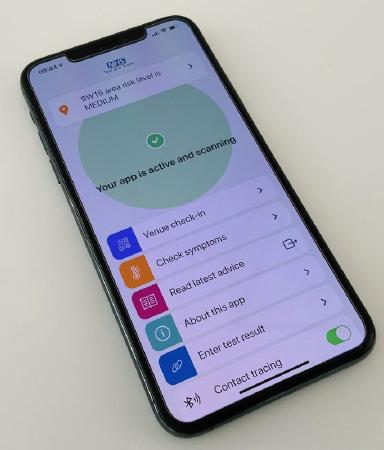
4 minute read
Covid Technical Divide and Covid Sanitation
L L THIS WEEK Locked out
How technology is leaving the elderly behind
Advertisement
By MARIANNA OWEN
In such a small amount of time, coronavirus has revolutionised the way we use technology and communicate.
Lockdown has forced us to find new ways to work and interact, whether this is exchanging work meetings for zoom calls, or online classes for those at universities.
Online shopping has reached a new popularity with an extra 32% of people saying they now order their grocery shopping online since the pandemic (Statista, 2020).
Our health is also reliant partly on technology, with the new NHS track-and-trace app utilising the use of Bluetooth to make people aware of when they have been in contact with someone who has coronavirus – a new way to asses risk and raise awareness of possible symptoms.
With older people more at risk of coronavirus, it’s ironic that these are the people who are more secluded from this newfound technology.
By CHARLES BAKER-MULLINGS
signed to combat the coronavirus pandemic, received their first public trials in Liverpool at the weekend.
The booths were created by the NOVID Team by repurposing an initial design for other viruses from 2019, after the coronavirus breakout earlier this year.
Proven to be 99.999% effective, the booths are capable of eradicating traces of COVID, influenza and norovirus.
Desribed as a “walk-through fogging device” by the company, users simply have to walk through the booth and within a matter of seconds come out the other side free of viral bacteria on their bodies and clothes.
The booths do not leave any residue or marks, and any user should be completely comfortable with the atmosphere inside. They are also fully
The Office for National statistics has reported that 100% of 16 – 24-year olds have access to a mobile phone with internet, compared to only 40% of over 65s.
Caroline Abrahams, Charity Director at Age UK, said: “While we welcome any new technology that helps tackle the virus, it’s important that no-one is disadvantaged or locked out of services simply because they don’t have a smartphoneor aren’t on the internet.
A substantial group – including the majority of those aged 75 and over – are not online and most of them never will be.”
Reasons for older people using less technology include a lack of technological knowledge, fears or concerns about security, and the cost of internet and smartphones.
Caroline added: “It’s important that the millions of older people without smartphones or the internet should be able to access services and support in a way that suits them,to avoid them biodegradable and environmentally friendly.
Over this weekend, the booths will initially be trialled on Liverpool hotel guests, and there are also booths situated at Grand Central on Renshaw Street.
If successful, these booths could be used in the future at sports stadiums, nightclubs and other public venues where mass amounts of people gather, as well as smaller places such as restaurants and bars.
These booths may prove to be the government’s next method of getting creative to tackle coronavirus after the introduction of a nationwide track and trace system, which has been the centre of controversy this week due to an IT failure in Public Health England’s system causing thousands of potential cases to go unrecorded.
The success of such innovations as the NOVID booth will be seen as vital in the battle to fend off the threat of a full lockdown once again.
Photo credit: Unsplash
being treated like second class citizens.”
Older people have also become victims of scams. With criminals taking advantage of their lack of technological skills and knowledge surrounding coronavirus testing.
Age UK have said: “Our advice is to be ultra-cautious about any calls or other communications you receive linked to coronavirus. For example, the Test and Trace service will never ask for bank details, payment, pins and passwords over the phone.
“If you suspect a scam or are worried that the call is not genuine just say that you will call them back and hang up.
Ways older people can get digital support:
Age UK support includes one to one support as well as tablet loan schemes. Visit Age UK’s website: www.ageuk. org.ukor call their free Advice Line on 0800 169 65 65 to find out the details for your local Age UK to see what support they can offer.
If anyone wants to inspire and motivate older people to get online, Age UK has aDigital Buddytraining video, which provides guidance on supporting older friends and relatives with digital technology and how it

City centre booths in bid to beat Covid
Human sanitation booths de
7
could benefit them.
We at Liverpool Life asked members of the public what they thought of the NOVID booths and whether they would be happy and willing to use them.
Childminder Sally James, 43, from Allerton, was complimentary yet pessimistic about the booths, saying: “They look like a good idea, but I do wonder what we’re actually being sprayed with (in the booths).
“Before using them, I would want a bit more clarification from the company making them about what actually happens in there, and if there are any side effects afterwards.”
Former construction worker Simon Beardsley, 58, from Chester, was extremely on board with the invention, saying: “I like it. I’d be happy to use one if it keeps the pubs, restaurants and bars open and makes them safer.
“The world needs to go back to normal as quickly as possible and if these are going to help us get there, then I think they’re worth trying at least.”








